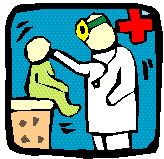Staying Afloat: Physicians in Katrina's Wake
Professor Weeks,
 I read your two Katrina-related papers on SSRN with much interest -- I found them (and you) through Jim Chen's Jurisdynamics web site. As a primary care provider (pediatrician) in Bay St Louis, Mississippi. I've had a very personal interest in this issue. As you correctly pointed out in the paper you presented at DePaul University, federal authorities have done almost nothing for individual providers. As a result of this and a number of unique constraints, individual physicians are largely bearing the brunt of the community's health care recovery.
I read your two Katrina-related papers on SSRN with much interest -- I found them (and you) through Jim Chen's Jurisdynamics web site. As a primary care provider (pediatrician) in Bay St Louis, Mississippi. I've had a very personal interest in this issue. As you correctly pointed out in the paper you presented at DePaul University, federal authorities have done almost nothing for individual providers. As a result of this and a number of unique constraints, individual physicians are largely bearing the brunt of the community's health care recovery.One possible (and fairly obvious) solution involves increased Medicaid payments to affected providers. My question to you regards the legal status/relationship of individual physicians as Medicaid providers, with regards to the government's role and responsibilities in providing care to the poor (via said Medicaid program). Yes, providers are vendors, but can providers also be seen as designated agents in delivering public health services? Does the percentage of Medicaid patients seen by a provider make a difference (e.g., I see about 65% Medicaid -- this especially becomes an issue since unlike a traditional vendor, I cannot negotiate my payments with the state; I must take what I am given; is this a more constricted relationship, almost a quasi-employee?).
I am obviously trying to explore the government's obligations towards individual providers of health care in fulfilling its larger obligations towards the community's public health (particularly in the context of recovery from a disaster such as Katrina), and I'd very much like your perspective on this line of inquiry.
Scott Needle MD FAAP
Bay St Louis Pediatrics
Bay St Louis MS
228.467.2200
sneedlemd@yahoo.com
Dear Dr. Needle,
Thank you for your email and for taking the time to read my articles. It's -- unfortunately -- comforting to hear that providers are truly struggling with this issue because the response I often receive from the academic community is that I am focusing on a minor part of the disaster response and preparedness problem. Maybe it's a product of my research bias in health care financing, but I do think the issue is crucial to maintaining a viable health care infrastructure.

As to your specific question and the role of Medicaid in paying providers for serving poor patients, specifically, and the public's health, generally, I'm afraid it doesn't fill the gap, as you surmise. Medicaid payment rates are set by individual states, under their federally approved state Medicaid plans, within the broad parameters of the federal Medicaid statute. There is no room for individual negotiation with providers, as far as I am aware, other than some trial programs such as pay-for-performance or other payment incentives. Physicians, like yourself, typically are paid based on a state-specific Medicaid physician fee schedule.
The federal statute states, in broad terms, that the state's provider payments must be adequate enough to enlist a sufficient number of providers to serve Medicaid program beneficiaries. One of the founding principles of Medicaid was to avoid creating a two-tier system of medical care, with the poor treated in public hospitals and clinics, and the rich treated in private facilities. Accordingly, Medicaid patients get an insurance card, like any other insured patient, and can go to any providers they choose, as long as the providers accept Medicaid as a form of payment. In most cases, providers must accept Medicaid reimbursement as payment-in-full and cannot "balance bill" the patient.
But from the physicians' end, as you know, whether to accept Medicaid patients is entirely voluntary. And many do not, for exactly the reason you identify: Inadequate reimbursement. Also, there may be a perception that Medicaid patients are higher utilization, harder to treat patients. Your idea about add-on payments to physicians who treat a high proportion of Medicaid or uninsured patients is a good one. State and federal governments do provide that sort of payment (disproportionate share, or DSH, or Dispro adjustments) to hospitals, on top of their standard reimbursement. As far as I know, there's no similar adjustment for physicians.
The major drawback of Medicaid as a way to cover the public health need, as I discuss in my papers, is that payment is tied to the patient, rather than a lump-sum to the provider. A DSH-type adjustment would be based on the overall percentange of Medicaid or uninsured patients in a physician's patient roles, not tied to each patient individually. That approach may be a better, more direct approach to compensating providers like yourself, who are bearing the brunt of the public health and uninsured need in post-disaster and other high medical need areas.
My initial interest in reimbursement for disaster response, post-9/11, was to approach the problem of inadequate reimbursement and drawbacks to our current approach to health care reimbursement, even in non-crisis times. Your question highlights those concerns. My hope, in approaching the issue from the homeland security or disaster response angle, is to draw more attention than the issue otherwise would attract. Perhaps the solutions we propose for first responders can be generalized to public health providers under non-disasterous circumstances.
Elizabeth
Elizabeth A. Weeks
Associate Professor
University of Kansas School of Law
1535 West 15th St.
Lawrence, KS 66045
(785) 766-9794
eweeks@ku.edu
Elizabeth,
 I'm sorry to hear that some of your peers feel that health care is a minor part of disaster issues. The government actually did fairly well in the acute response to Katrina with the DMATs and mobilizing other field hospitals, but the long-term recovery remains ignored. It may be a small part of the big picture, but to those of us involved in it, it's pretty much all-consuming. I had "discovered" the DSH payment system just a day or two before I wrote to you. I agree that this seems like a promising idea, if the right people could be convinced.
I'm sorry to hear that some of your peers feel that health care is a minor part of disaster issues. The government actually did fairly well in the acute response to Katrina with the DMATs and mobilizing other field hospitals, but the long-term recovery remains ignored. It may be a small part of the big picture, but to those of us involved in it, it's pretty much all-consuming. I had "discovered" the DSH payment system just a day or two before I wrote to you. I agree that this seems like a promising idea, if the right people could be convinced.Scott
Scott,
 Perhaps I overstated; it's not that my colleagues minimize the role of health care in disaster response, generally, but the need to prospectively consider reimbursement for health care providers, specifically. I'm with you; I think that both issues merit very careful planning and consideration.
Perhaps I overstated; it's not that my colleagues minimize the role of health care in disaster response, generally, but the need to prospectively consider reimbursement for health care providers, specifically. I'm with you; I think that both issues merit very careful planning and consideration.Elizabeth












1 Comments:
Having spent a few days this last week with DHS people in DC, I can safely say that they are probably light years away from thinking of strategies like that. Maybe I just wasn't with the right ones, but whenever the terms "paying for," "financing," or others similar came up, the quick response was, "we're saving those discussions for another time." They really are focusing on individual needs first, which has
both pros and cons.
Michael H. Fox, Sc.D.
Associate Professor
Department of Health Policy and Management
School of Medicine, University of Kansas Medical Center
Kansas City, Kansas 66160; mfox2@kumc.edu; 913 588-2687 and
Senior Research Scientist, Research and Training Center for Independent Living, University of Kansas
Lawrence, Kansas 66045; mfox@ku.edu; 785 864-0587
Post a Comment
<< Home